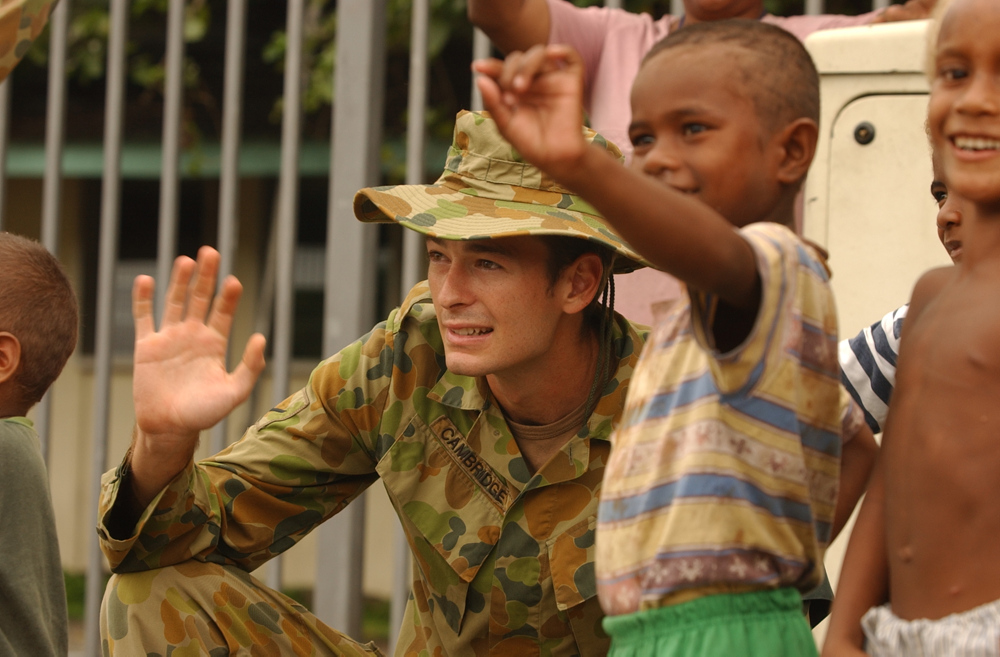
On 30 June this year the Regional Assistance Mission to Solomon Islands (RAMSI) will come to an end. Established in July 2003, RAMSI has been a feature of life in Solomon Islands for more than a third of its history as an independent country.
While much of what follows is anecdotal, recent visits to Honiara have provided some insight into the mood among Solomon Islanders as the end of RAMSI approaches. The operation has been in a gradual wind-down since 2013 and is now much less visible that it was in earlier years. Even so, RAMSI still looms large in the minds of Solomon Islanders.
RAMSI will be leaving Solomon Islands in an atmosphere of general goodwill. The Solomon Islands government is planning a series of events to mark the end of RAMSI in late June. These will be the occasion for sincere and heartfelt expressions of gratitude for RAMSI’s role in restoring the rule of law and the functioning of government in Solomon Islands. Much stress will—rightly—be placed on the regional nature of RAMSI’s composition.
Although RAMSI couldn’t have been mounted or sustained without Australian funding and personnel, it was the participation of all of Solomon Islands’ Pacific neighbours in RAMSI that gave it its particular character, and lent it genuine legitimacy in the eyes of Solomon Islanders. RAMSI’s positive reputation has, among other things, been underpinned by a record of good behaviour and conduct on the part of its personnel.
Alongside those warm feelings, though, it isn’t hard to detect a level of anxiety among ordinary Solomon Islanders as to what might come next. The Royal Solomon Islands Police Force (RSIPF) was disarmed at the very outset of RAMSI and it was only on 8 May this year that elements of the force were rearmed, in anticipation of RAMSI’s departure and following extensive training and preparation. Solomon Islands police were seen to play an aggressively partisan role during the euphemistically-described ‘Tensions’ that preceded RAMSI’s deployment. Despite extensive leadership and generational turnover since then, the RSIPF has struggled to regain the trust of the general population. For many Solomon Islanders the jury remains out on the competence and impartiality of their own police.
Some Solomon Islanders say they fear that once RAMSI is off the scene, weapons that were hidden throughout the RAMSI period will once again play into local politics. Recent crimes, in particular the horrific
double-murder of a Solomon Islands couple of Chinese ethnicity at Easter, have done nothing to settle nerves about a post-RAMSI future. Earlier this month, clashes between long-term squatters and local land developers on Honiara’s crowded and only semi-regulated periphery were well-handled by the local police, but they’ve nevertheless served as a reminder of unresolved and intractable issues that continue to generate social stresses in Solomon Islands.
Popular faith in Solomon Islands’ state institutions more broadly is yet to recover from the Tensions period. Complaints about corruption remain commonplace. Cynicism about politicians and the political process appears alarmingly widespread. This is despite (or perhaps because of) the fact that Solomon Islanders are increasingly dependent on the goodwill of their individual MPs through the distribution of ‘Constituency Development Funds’ which have risen to record levels (only matched, on a global scale, by Solomon Islands’ neighbour Papua New Guinea).
New life has also been breathed into a longstanding constitutional debate with calls for a radical redistribution of resources via a shift to a federal system of government, which would see most revenues going to proposed new ‘states’. Given the interest of national politicians in retaining control over national resources (and their control over any changes to the Constitution), that’s unlikely to happen but it illustrates a sense in which Solomon Islands itself remains a work in progress, 39 years after independence and 14 years after the arrival of RAMSI.
That isn’t to suggest that RAMSI is leaving Solomon Islands in a national funk. After all, some level of nervousness is only natural after such a long intervention. There’s no doubt that RAMSI is leaving Solomon Islands better equipped to manage the many challenges it continues to face. The arrest in April this year of
a government minister on corruption charges must go at least some way to countering perceptions of impunity among Solomon Islands political class. At the same time, it isn’t hard to meet impressive young and emerging leaders in many walks of life. Beyond government, we shouldn’t forget the critical role played by local institutions, and in particular the churches, in providing structure to people’s lives and indeed in delivering services that the state can’t provide.
After RAMSI departs, Australia will still provide extensive advisory and training assistance to the RSIPF, although Australian police advisers will no longer enjoy direct policing power. In a significant move, Australia is
negotiating a treaty with Solomon Islands which would allow Australia to provide assistance ‘in the case of a major security crisis in the future’.
As RAMSI draws to a close, Solomon Islanders will hope that such assistance is never again required. But they can be assured that it will be available.
 Print This Post
Print This Post